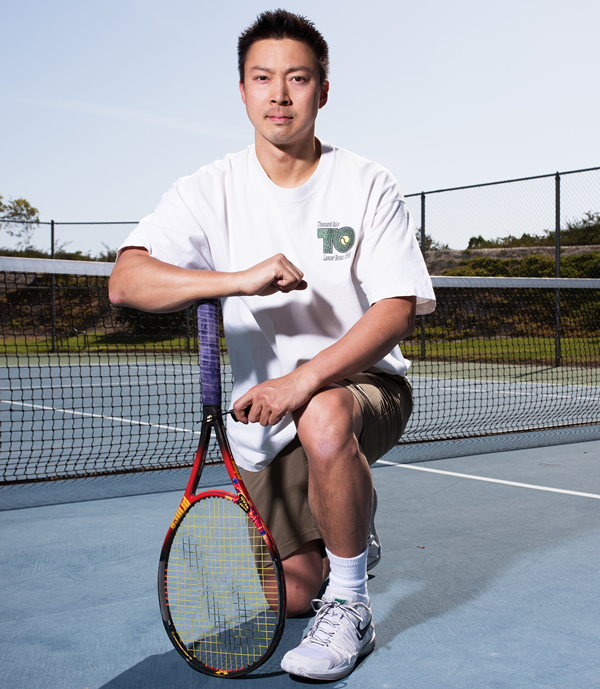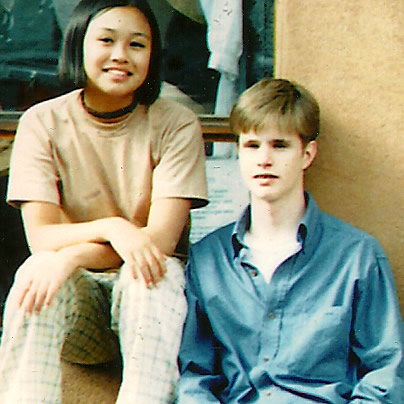Sports
‘Fearless’ athletes
Gay photographer finds redemption profiling others


Photographer Jeff Sheng didn’t think being out as an athlete was an option in his younger years. (Photo courtesy Sheng)
At the beginning of his senior year in Thousand Oaks, Calif., Jeff Sheng did something that probably surprised everyone who knew him.
He was a varsity tennis player and had just been named co-captain of his high school team by his teammates, a team his younger brother was just joining as a talented freshman player.
Before his senior year tennis season even started, he quit the sport he loved and had been playing since childhood.
It was 1997 and Sheng was in the middle of confronting his own sexual orientation and didn’t believe that he could continue as an athlete.
In a quote from his new photography book “Fearless: Portraits of LGBT Athletes,” he writes, “I believed that being openly gay and being a competitive athlete were incompatible with each other. There were no visible role models to show me otherwise.”
In an attempt to fill the hours that were once occupied by tennis, Sheng turned his attention to photography. He went on to Harvard University and earned a degree in filmmaking and photography from the visual and environmental studies program.
It was at the end of his freshman year at Harvard that Sheng met his first boyfriend and began the process of coming out of the closet. His boyfriend was on the Harvard water polo team and Sheng began snapping photographs of their life together. The photos would later become his senior thesis.
The relationship ended in their sophomore year due in part to the fact that Sheng was becoming more comfortable with being openly gay and his boyfriend was still closeted to most of his water polo teammates.
His ex-boyfriend eventually did come out to his teammates before graduation and Sheng found himself reflecting on what it would have been like to compete as an openly gay athlete.
Sheng began photographing openly gay student athletes in 2003 and by 2012 had accumulated roughly 140 subjects.
“My reasoning for starting the ‘Fearless’ project was about never being able to be an out athlete myself,” Sheng says. “It was inspiring to encounter people who were doing something that I hadn’t been able to do. I found myself moved by their bravery.”
After initially starting with college athletes, Sheng expanded the Fearless project to include high school LGBT athletes. Over the years since 2003, the photos have been exhibited at the Nike and ESPN headquarters along with 70 other venues.
Following a slideshow exhibit at Pride House during the 2012 London Olympics, the ideas for making a book to further the LGBT sports movement began to jell.
“Everyone kept telling me that these images were powerful and that they needed to reach more people,” Sheng says. “I didn’t want to make another gay coffee table book. It needed to be a work of art that gave appropriate recognition to the LGBT sports movement.”
A Kickstarter campaign was launched and the funds were generated to photograph 60 more athletes. The resulting book, released on June 9, features photographs of 202 LGBT athletes, a timeline of the LGBT sports movement, backstories of five of the photographed athletes and a memoir of Sheng’s journey.
The book concludes with an afterword essay by retired NBA basketball player Jason Collins who celebrates and praises the authenticity and bravery of the athletes.
“I am hoping that mothers and fathers in underserved areas can look at this book and find a connection to their own child,” Sheng says. “We have had so much remarkable progress in the LGBT sports movement. A movement happens not because of just one person; it is a collection of the lives of many people.”
Sports
US wins Olympic gold medal in women’s hockey
Team captain Hilary Knight proposed to girlfriend on Wednesday

The U.S. women’s hockey team on Thursday won a gold medal at the Milan Cortina Winter Olympics.
Team USA defeated Canada 2-1 in overtime. The game took place a day after Team USA captain Hilary Knight proposed to her girlfriend, Brittany Bowe, an Olympic speed skater.
Cayla Barnes and Alex Carpenter — Knight’s teammates — are also LGBTQ. They are among the more than 40 openly LGBTQ athletes who are competing in the games.
The Olympics will end on Sunday.
Sports
Attitude! French ice dancers nail ‘Vogue’ routine
Cizeron and Fournier Beaudry strike a pose in memorable Olympics performance

Madonna’s presence is being felt at the Olympic Games in Italy.
Guillaume Cizeron and his rhythm ice dancing partner Laurence Fournier Beaudry of France performed a flawless skate to Madonna’s “Vogue” and “Rescue Me” on Monday.
The duo scored an impressive 90.18 for their effort, the best score of the night.
“We’ve been working hard the whole season to get over 90, so it was nice to see the score on the screen,” Fournier Beaudry told Olympics.com. “But first of all, just coming out off the ice, we were very happy about what we delivered and the pleasure we had out there. With the energy of the crowd, it was really amazing.”
Watch the routine on YouTube here.
Italy
Olympics Pride House ‘really important for the community’
Italy lags behind other European countries in terms of LGBTQ rights

The four Italian advocacy groups behind the Milan Cortina Winter Olympics’ Pride House hope to use the games to highlight the lack of LGBTQ rights in their country.
Arcigay, CIG Arcigay Milano, Milano Pride, and Pride Sport Milano organized the Pride House that is located in Milan’s MEET Digital Culture Center. The Washington Blade on Feb. 5 interviewed Pride House Project Manager Joseph Naklé.
Naklé in 2020 founded Peacox Basket Milano, Italy’s only LGBTQ basketball team. He also carried the Olympic torch through Milan shortly before he spoke with the Blade. (“Heated Rivalry” stars Hudson Williams and Connor Storrie last month participated in the torch relay in Feltre, a town in Italy’s Veneto region.)
Naklé said the promotion of LGBTQ rights in Italy is “actually our main objective.”
ILGA-Europe in its Rainbow Map 2025 notes same-sex couples lack full marriage rights in Italy, and the country’s hate crimes law does not include sexual orientation or gender identity. Italy does ban discrimination based on sexual orientation in employment, but the country’s nondiscrimination laws do not include gender identity.
ILGA-Europe has made the following recommendations “in order to improve the legal and policy situation of LGBTI people in Italy.”
• Marriage equality for same-sex couples
• Depathologization of trans identities
• Automatic co-parent recognition available for all couples
“We are not really known to be the most openly LGBT-friendly country,” Naklé told the Blade. “That’s why it (Pride House) was really important for the community.”
“We want to use the Olympic games — because there is a big media attention — and we want to use this media attention to raise the voice,” he added.

Naklé noted Pride House will host “talks and roundtables every night” during the games that will focus on a variety of topics that include transgender and nonbinary people in sports and AI. Another will focus on what Naklé described to the Blade as “the importance of political movements now to fight for our rights, especially in places such as Italy or the U.S. where we are going backwards, and not forwards.”
Seven LGBTQ Olympians — Italian swimmer Alex Di Giorgio, Canadian ice dancers Paul Poirier and Kaitlyn Weaver, Canadian figure skater Eric Radford, Spanish figure skater Javier Raya, Scottish ice dancer Lewis Gibson, and Irish field hockey and cricket player Nikki Symmons — are scheduled to participate in Pride House’s Out and Proud event on Feb. 14.
Pride House Los Angeles – West Hollywood representatives are expected to speak at Pride House on Feb. 21.
The event will include a screening of Mariano Furlani’s documentary about Pride House and LGBTQ inclusion in sports. The MiX International LGBTQ+ Film and Queer Culture Festival will screen later this year in Milan. Pride House Los Angeles – West Hollywood is also planning to show the film during the 2028 Summer Olympics.
Naklé also noted Pride House has launched an initiative that allows LGBTQ sports teams to partner with teams whose members are either migrants from African and Islamic countries or people with disabilities.
“The objective is to show that sports is the bridge between these communities,” he said.
Bisexual US skier wins gold
Naklé spoke with the Blade a day before the games opened. The Milan Cortina Winter Olympics will close on Feb. 22.
More than 40 openly LGBTQ athletes are competing in the games.
Breezy Johnson, an American alpine skier who identifies as bisexual, on Sunday won a gold medal in the women’s downhill. Amber Glenn, who identifies as bisexual and pansexual, on the same day helped the U.S. win a gold medal in team figure skating.
Glenn said she received threats on social media after she told reporters during a pre-Olympics press conference that LGBTQ Americans are having a “hard time” with the Trump-Vance administration in the White House. The Associated Press notes Glenn wore a Pride pin on her jacket during Sunday’s medal ceremony.
“I was disappointed because I’ve never had so many people wish me harm before, just for being me and speaking about being decent — human rights and decency,” said Glenn, according to the AP. “So that was really disappointing, and I do think it kind of lowered that excitement for this.”















